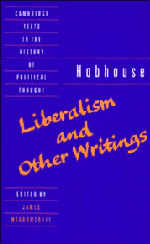Book contents
- Frontmatter
- Contents
- Acknowledgements
- Introduction
- Principal events in the life of L. T. Hobhouse
- Further reading
- Biographical notes
- Liberalism
- Chapter I Before Liberalism
- Chapter II The Elements of Liberalism
- Chapter III The Movement of Theory
- Chapter IV ‘Laissez-faire’
- Chapter V Gladstone and Mill
- Chapter VI The Heart of Liberalism
- Chapter VII The State and the Individual
- Chapter VIII Economic Liberalism
- Chapter IX The Future of Liberalism
- Other Writings
- Index
- Title in the series
Chapter IV - ‘Laissez-faire’
Published online by Cambridge University Press: 05 June 2012
- Frontmatter
- Contents
- Acknowledgements
- Introduction
- Principal events in the life of L. T. Hobhouse
- Further reading
- Biographical notes
- Liberalism
- Chapter I Before Liberalism
- Chapter II The Elements of Liberalism
- Chapter III The Movement of Theory
- Chapter IV ‘Laissez-faire’
- Chapter V Gladstone and Mill
- Chapter VI The Heart of Liberalism
- Chapter VII The State and the Individual
- Chapter VIII Economic Liberalism
- Chapter IX The Future of Liberalism
- Other Writings
- Index
- Title in the series
Summary
The school of Cobden is affiliated in general outlook both to the doctrine of natural liberty and to the discipline of Bentham. It shared with the Benthamites the thoroughly practical attitude dear to the English mind. It has much less to say of natural rights than the French theorists. On the other hand, it is saturated with the conviction that the unfettered action of the individual is the mainspring of all progress. Its starting-point is economic. Trade is still in fetters. The worst of the archaic internal restrictions have, indeed, been thrown off. But even here Cobden is active in the work of finally emancipating Manchester from manorial rights that have no place in the nineteenth century. The main work, however, is the liberation of foreign trade. The Corn Laws, as even the tariff reformers of our own day admit, were conceived in the interest of the governing classes. They frankly imposed a tax on the food of the masses for the benefit of the landlords, and as the result of the agricultural and industrial revolutions which had been in progress since 1760, the masses had been brought to the lowest point of economic misery. Give to every man the right to buy in the cheapest and sell in the dearest market, urged the Cobdenite, and trade would automatically expand.
- Type
- Chapter
- Information
- Hobhouse: Liberalism and Other Writings , pp. 37 - 48Publisher: Cambridge University PressPrint publication year: 1994



